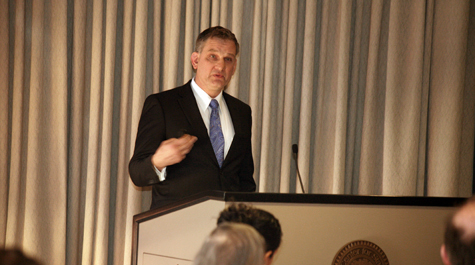Professor Dwyer Discusses Special Rights During St. George Tucker Lecture
On February 13, Arthur B. Hanson Professor of Law James G. Dwyer delivered the 2014-2015 St. George Tucker Lecture during a luncheon at the National Center for State Courts in Williamsburg. Dwyer's presentation was titled "The Special Rights Fallacy: How Rights Enactments for Vulnerable Groups Can Actually Make Them Worse Off."
The St. George Tucker Lecture Series recognizes the scholarly achievements of a senior member of the law faculty each year. The series was established in 1996 and is made possible through the generosity of Law School alumni.
Professor Vivian Hamilton introduced Dwyer as "a long-time and highly-regarded defender of an approach to policy that truly respects children."
"At the core of his work are rigorous, theoretical justifications for the state's obligations to its children and frequently controversial, practical implications of that obligation to our children. We don't always think of our profession as requiring bravery, but it takes bravery to advance and defend positions that you know will meet near universal resistance and opposition. Professor Dwyer has been brave... a lot," she said.
In his lecture, Dwyer clarified the concept of special rights, catalogued ways that special rights can be bad for groups that have them, and suggested some arguments for rejecting the impulse to create special rights for children.
"We generally assume when enacting special rights for a particular group, that it must be all good for them. We are usually quite proud of having done so," he said. "The simple point I'm going to make and illustrate today is that this is a fallacy."
As one example, he discussed international adoptions and stipulations that concern children's cultural needs or children's right to preserve their cultural identity.
"What these bodies [making such stipulations] will not acknowledge is that babies in orphanages do not have an identity or family relations to preserve, and they do not have a religious, cultural, or linguistic background to maintain. Ascribing such things to them is an adult-serving delusion. Nor will they acknowledge that even if babies had this interest, far more basic needs dwarf those interests in importance."
He did not suggest that general rights eliminate all problems or that special rights are not necessary for some groups. He argued that advocates should be wary when pursuing a special rights agenda.
Dwyer holds a Ph.D. from Stanford University (Moral and Political Philosophy) and a J.D. from Yale Law School. He is the author of several books (including a forthcoming book on the history and philosophy of homeschooling) and dozens of law review articles.
About William & Mary Law School
Thomas Jefferson founded William & Mary Law School in 1779 to train leaders for the new nation. Now in its third century, America's oldest law school continues its historic mission of educating citizen lawyers who are prepared both to lead and to serve.
